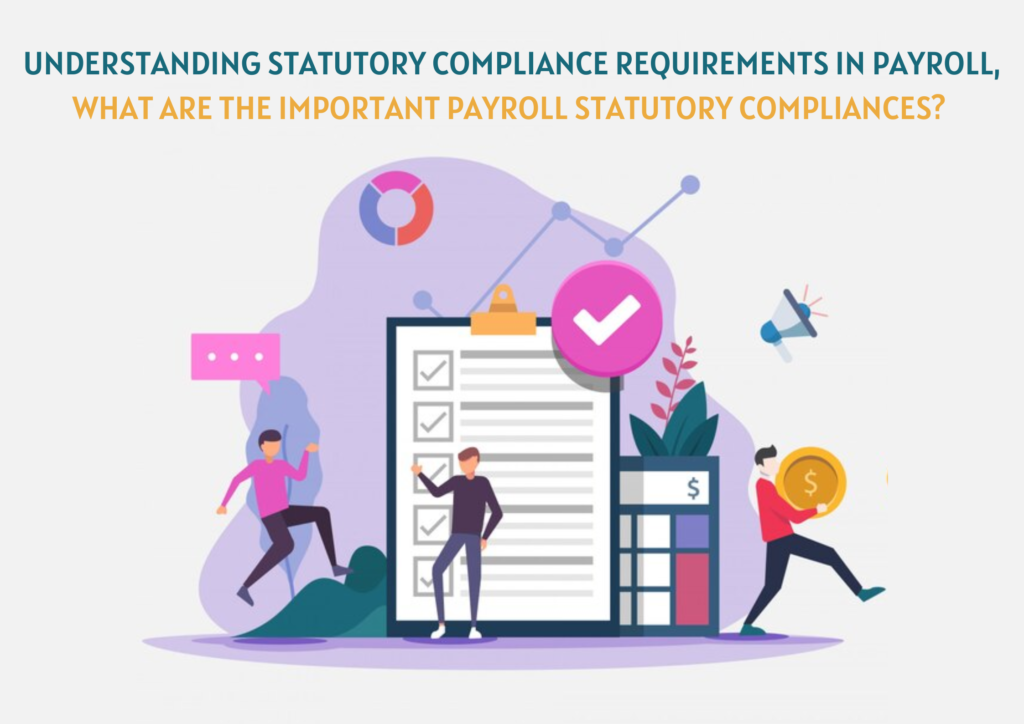What Is Statutory Compliance?
Statutory compliance is a predefined legal framework with which the organization functions and treat its employee in a way that abides and adheres to various central and state labour laws. Statutory compliance is beneficial to all employees and employers. It makes an assured definite structure for the employees to get their salary on schedule. It reveals the satisfactory level of the employee. The employer clarifies rules and regulations and secures the employer from penalties and legal actions.
Statutory Compliance in Payroll:
Statutory compliance in payroll refers to how an organization adheres to all lawsuits about payroll. The process where HR managers gain knowledge and carry out tasks related to payroll processes is called payroll compliance legislation. Every company must follow specific standards, laws, and regulations. Statutory compliance in payroll includes social security, industrial relation labor laws, and Employees’ salaries and benefits. It creates an upgraded ethical environment to be worked safely under upright circumstances. Due to statutory compliance, there are clear guidelines for tax payments.
Let Us Dive into The Significant Aspects of Statutory Compliance:
Statutory compliance keeps changing from time to time, and it is essential to be adhered to it to make the laws liable. The beneficiaries to the employee prevent undesired working hours, exploitation, or harassment. It ensures the employee for their work and that the companies adhere to the minimum wage rate. The primacy to the employer includes avoiding legal issues with predetermined rules and the awareness of statutory compliance. So, there is less risk of prejudicial incidents in outsourcing with the statutory compliant, comprehensive guidelines.
(Read more: Payroll Compliance – An Ultimate Guide)
List of Payroll Statutory Compliance Requirements:
Minimum Wages Act of 1948:
The minimum wages act of 1948 framed certain minimum wages for different working sections. The salary is based on the occupation, sector or industry, state, and national levels. Statutory compliance ensures that labor is paid comparatively. The workers’ medical, education, and basic living expenses are considered while setting the minimum rate. Workers get their salaries based on their skills and the other criteria for the respective job. This act prevents companies from taking advantage of employees and paying them less than they deserve.
The Employees State Insurance Act, 1948:
This act is a social security scheme for employees and their family members. This mainly aims to provide medical benefits on account of any injuries, disabilities, chaos, or sickness for insurers and their dependents and maternity benefits for women. This statutory compliance is mandatory for businesses that employ more than twenty workers or permanent factories with more than ten laborers. The claims can be made at all ESIC hospitals, private practitioners, and medical service outlets. It maintains a good wrap-up and a healthy relationship between employee and employer.
Employees Provident Fund Act (Epf), 1952:
PF is a social security benefit that is paid amply at retirement. The Employees’ Provident fund Organization administers it. Under the EPF scheme, both employee and employer contribute towards PF.PF is a compulsory deduction; this money is saved in the PF account and can be withdrawn only after a certain period of lock-in. The PF act offers to help employees save money to meet their future needs.
Professional Tax:
Employment or professional tax is a state-based tax. It is one of the statutory deductions from an employee’s gross income before computing their tax.
Labour Welfare Fund:
Labour welfare Fund (LWF) is a statutory contribution by state authorities managed individually. This contribution is carried out to benefit workers in the unorganized sector. The contribution rate, the last date to contribute and the penalty contribution differs from one state to the other.
Challenges in Attaining Payroll Compliance:
- Lack of information: Making aware of the government legislation to business professionals Legislation needs to be more expertise in their field, so they lack explicit statutory norms. This makes a hindrance factor for the employer complying payroll service provider accurately with statutory regulations.
- Sectioned compliance management: Companies usually have different departments for handling tasks such as tax calculations, leave management, recruit data entry, etc. All these details are considered to attain a legitimate payroll. Having segmented departments for these procedures makes the process very error-prone.
- Different places and laws: Different statutory regulations are implemented for other states with varying payroll rules for the payroll compliance service provider activities.
- Inconsistent rules-All government regulations keep changing and updating with time and circumstances. The unpredictability of statutory requirements makes it even harder for employees to abide by them.
- Extra work hours to ensure statutory compliance– Ensuring the payroll is statutorily compliant requires more time and attention. Managing payroll service is a big task, and employers must make laws-abiding. It also makes the overall expenditure on payroll higher.
(Read more: Key Benefits of Payroll Compliance)
Wrap-Up
Talentpro, Statutory Compliance in payroll is a crucial element in the organization, so make it easy to work with Talentpro, cope-up with the aspects of the compliance that helps in the compliance and payroll service providing demands of the organization and hence helps to get rid of tangles and help to tackle all the compliant-reliant services.









